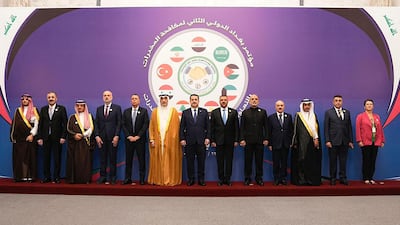Iraqi Prime Minister Mohammed Shia Al Sudani on Monday warned the trafficking and consumption of illegal drugs poses a significant threat to the region's stability, and called for orchestrated efforts to tackle the issue.
Mr Al Sudani was speaking at the second Baghdad International Conference to Fight Drugs in which interior ministers from Kuwait, Iran and Jordan as well as other officials took part.
“We see drugs as a fundamental factor for instability in the region,” Iraq's Prime Minister told the one-day conference in his inaugural speech.
He said the impact of drugs was similar to that of terrorism as it aimed “to destabilise our security and the stable foundations of our societies, dismantle families and use these poisons to recruit suicide bombers and killers – all these are interconnected elements”.
Addressing the rising drugs trade has been a major security challenge for countries in the region, particularly Iraq, where the fight against narcotics has been stepped up, leading to authorities seizing large quantities.
“The harm of drugs is no different from the effects of wars, displacement and the uprooting the peoples from their historical foundations,” Mr Al Sudani added.
He called for “unifying efforts and enhancing joint co-ordination” in fighting drugs trafficking and consumption.

Iraq was considered a vital corridor for the smuggling of drugs to neighbouring countries before the 2003 US-led invasion that toppled Saddam Hussein’s regime. Since then, drug use in the country has increased greatly.
A succession of weak governments, widespread corruption among security forces and a lack of co-operation between government agencies are the main reasons behind drugs proliferation.
The most widely used drug in the country is crystal methamphetamine, followed by Captagon, according to the Health Ministry. Others include tramadol, heroin and hashish, it says.
Iran is said to be the main source of crystal methamphetamine found in Iraq, while Syria is the source of most of the Captagon, Iraqi officials have said. Lebanon is also a point of origin of Captagon.
Iraqi Interior Minister Lt Gen Abdul Amir Al Shammari called for a wide international and regional drugs policy, and warned “the danger of this scourge is growing rapidly and will strike everywhere, just like ISIS targeted our communities over the past 10 years”.
In recent years, Iraq has increased operations aimed at curbing drug smuggling and consumption. A number of Iraqi and foreign dealers have been arrested, and drugs have been seized almost daily. However, the pursuit of drug dealers has at times led to the killing of security and government officials.
Last July, the Interior Ministry announced that security forces had found a factory used to produce Captagon, the first such discovery in the country.
The site was uncovered in Al Muthana province, about 300km south of Baghdad and near the border with Saudi Arabia, the ministry said.
The same year, it also announced dismantling what was described as the "most dangerous international drug-trafficking ring", arresting three of its members in Muthana province. Two million Captagon pills were seized.
Growing risk
In a report released on Monday, the UN Office on Drugs and Crimes warned that countries across the region have "registered an escalation in both the scale and sophistication of drug-trafficking operations over the past decade".
"The destabilising risks posed by illicit drugs have become increasingly prominent on the regional agenda," UNODC said.
In addition to concerns sparked by trafficking and consumption, rising production is also an issue, the report which covers the years from 2019 to 2023 found. Top among these amphetamine-type stimulants (ATS) are tablets sold under the name Captagon, and methamphetamine, it said.
Methamphetamine seizures increased almost sixfold in 2023 compared to 2019, while Captagon seizures reportedly tripled from 2022 to 2023. Overall amounts of drugs seized in 2023 are 34 times higher than in 2019.
"The legacy of armed conflicts and fragmented state authorities in the wider region have created an environment conducive to the spread and entrenchment of drug production, trafficking and consumption," the report said.
One of the challenge facing countries across the Middle East is a number of "armed groups with cross-border affiliations and transborder economic interests. Alongside a recent history marked by armed conflict and corruption, this situation has contributed to cross-border trafficking," it added.
Over the past five years, UNODC has found a sharp increase in trafficking and use of Captagon in Iraq and neighbouring countries.
Seizures of amphetamine, mainly in the form of Captagon, in the region doubled from 2020, reaching a record high of 86 tonnes in 2021.
In Iraq, Captagon seizures increased by almost 3.38 per cent, with authorities reporting the seizure of more than 4.1 tonnes of the tablets last year alone.
It warned that Iraq is "at risk of becoming an increasingly important node" in the drug-trafficking network spanning the region.
Iraq lies near the intersection of a complex web spanning south-west Asia, Africa and Europe, notably the Balkan and southern routes associated with opiate smuggling from Afghanistan to Europe, through south-eastern Europe and towards the Indian Ocean and Eastern Africa, including through the Arabian Peninsula, the report said.
"The expansion of criminal networks in Iraq and across the region was facilitated by chronic political and economic instability," it said.


